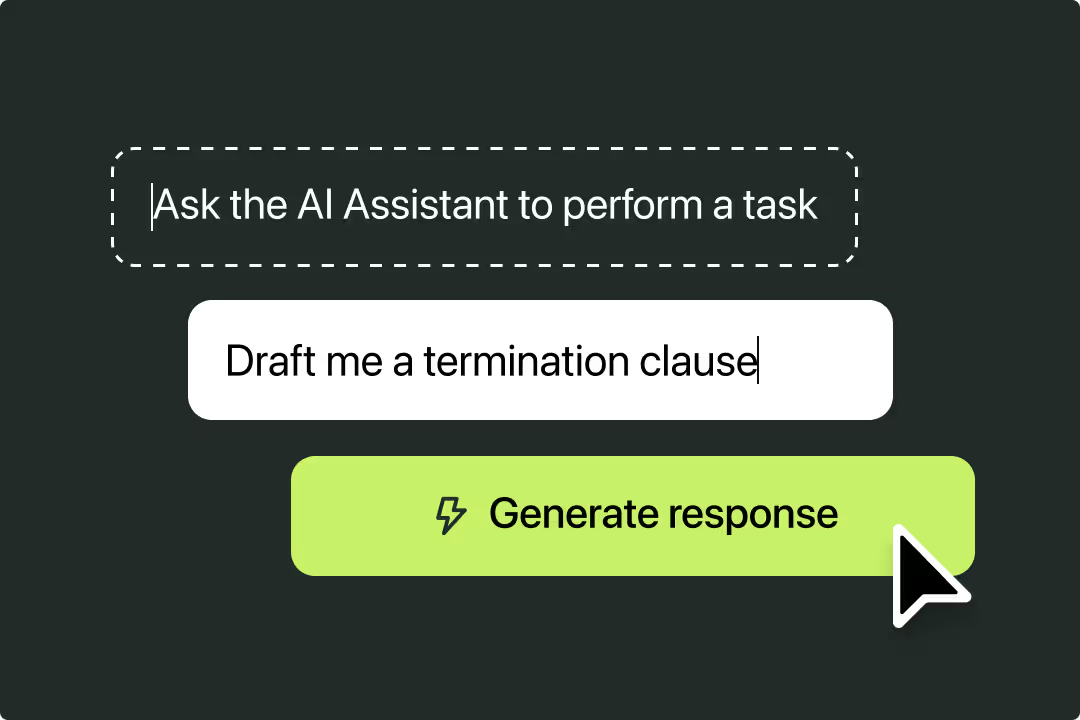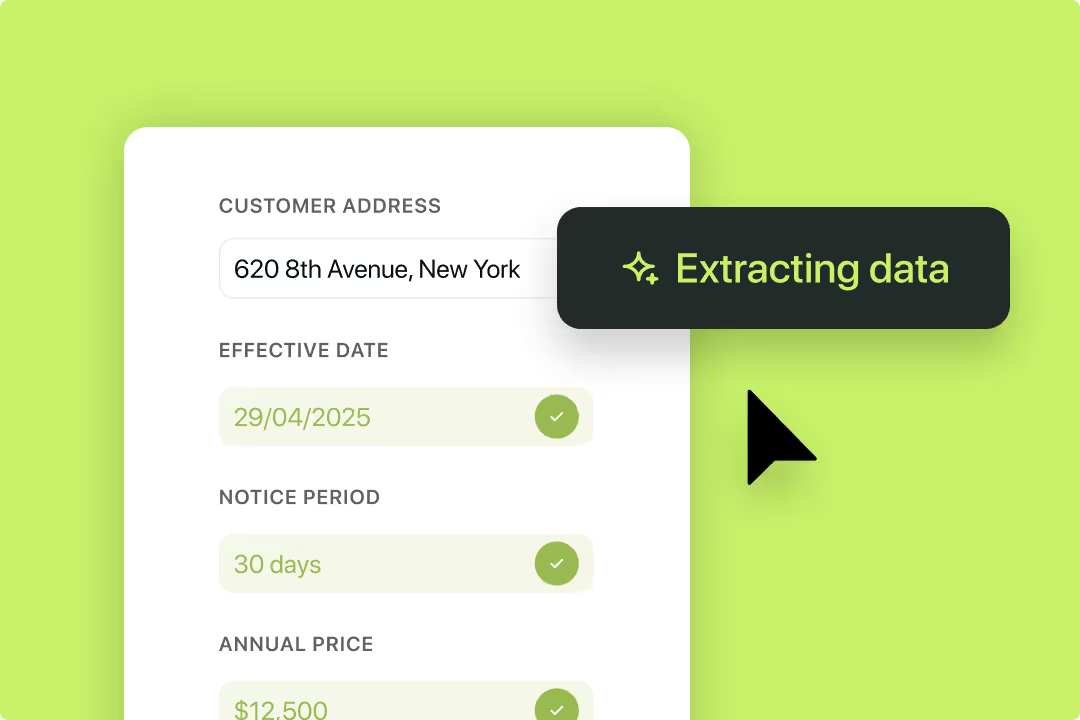Solutions
Customer Support
Resources
A legal AI chatbot is technology that uses artificial intelligence to engage in text-based conversations with users, providing legal information and assistance.
Legal AI chatbots are programmed with vast databases of legal knowledge. This allows them to answer a wide range of legal questions, from simple inquiries about legal definitions to more complex issues relating to contract review and compliance.
The legal industry is a great candidate for automation, with a recent study by Goldman Sachs estimating that 44 per cent of legal tasks could be automated. But what are the benefits of AI for lawyers, and how do legal AI chatbots deliver on these?
Legal AI chatbots can significantly increase productivity for law firms and legal professionals by expediting manual processes and reducing the burden on lean in-house teams.
They can automate routine legal admin tasks, like creating contract summaries and legal research, allowing lawyers to focus more on complex legal work. This efficiency not only saves time but also reduces operational costs.
Legal AI chatbots can conduct in-depth legal research in seconds by scanning vast volumes of legal documents and precedents.
The chatbots' ability to analyze and present relevant legal information in a structured manner streamlines the research process. Lawyers can then verify this research and use it to quickly understand the legal landscape.
AI chatbots provide a user-friendly interface for individuals seeking legal guidance. They enhance access to legal information by offering quick and accurate responses to legal queries, making legal knowledge more readily available to the general public.
This democratization of legal information empowers individuals to make informed decisions and better understand their rights and obligations.
Before we explore specific legal AI chatbot vendors, let's review the kind of considerations we're benchmarking these vendors against, and more importantly, why.
There are plenty of legal AI solutions on the market, and legal AI chatbots are no exception. However, different chatbots perform different functions for different legal professionals, so it's important to understand how they compare and which AI chatbot is right for you. Let's explore twelve of the best solutions on the market today.
Juro's legal AI is a legal AI chatbot that specializes in contract management processes, enabling users to draft, summarize and review contracts 10x faster than with purely human-led processes.

Unlike most legal AI chatbots, Juro’s legal AI Assistant lives within an intelligent, end-to-end contract automation platform. Juro users leverage AI to review, draft and summarize contracts, but they can also create, negotiate, approve, sign, store, and manage their contracts in the platform.
This is what sets Juro apart from other legal AI chatbots on the market that act as point solutions.
Embedding a legal AI chatbot in the places where contracts are already being agreed and managed also means that the responses you get back are more contextual and accurate than those from chatbots that exist in silos and don't have any information about your organization's guardrails and parameters.
Juro's legal AI chatbot was also built with privacy in mind, offering EEA hosting for GPT interactions and ensuring that contracts and prompts are never sent to train LLMs. This solves for many of the security and privacy concerns that are front of mind for in-house legal teams today.
Want to see Juro's AI Assistant in action? Hit the button below to book your personalized demo of the platform.

Harvey AI is a legal AI chatbot designed for law firms and consulting companies. It is one of the most recognized legal AI chatbots on the market, partnering with law firms like Allen & Overy and consulting giants like PwC.
Like Juro’s legal AI assistant, Harvey AI is built on Open.AI’s GPT and uses natural language processing and machine learning to automate routine legal tasks like due diligence, litigation, and legal document analysis.
The legal AI chatbot is also trained on the law firm’s templates and offerings, increasing the relevance and accuracy of the outputs as a result.

LawDroid Copilot is a legal AI chatbot that law firms can use to automate documents, conduct legal research, and brainstorm ideas. This functionality enables LawDroid users to scale their processes and operate more efficiently.
Separately to this, LawDroid offers a no-code AI development platform, enabling law firms to set up their own client-facing legal AI chatbots. It allows firms to incorporate video and other forms of content into their responses.

CaseMine is another GPT-powered legal AI chatbot designed to respond to inquiries and conduct legal research. Founded in India, this AI chatbot specializes in the retrieval of information, specifically judgments, opinions, and citation contexts from case law.
CaseMine is distinct from many other legal AI chatbots because users can also access other functionality, including a visualization tool to see how various precedents have evolved over time and a way to focus on the opinions of specific judges.

DoNotPay is a free consumer-focused legal AI chatbot. Unlike other legal AI tools that are designed to serve law firms and in-house legal departments, DoNotPay was designed to help consumers regain their power over big corporations.
DoNotPay users can leverage AI responses to cancel services, dispute parking tickets, claim back money, and request refunds in instances where the companies they’re dealing with haven’t proven supportive.

Casetext is a legal AI chatbot that works with law firms, litigators, and attorneys, making it one of the most dynamic on the market.
Also known as CoCounsel, the legal AI chatbot can conduct legal research, prepare for depositions, summarize legal documents, and review them for compliance. This enables legal professionals to work faster and more efficiently on these tasks, freeing up time for higher-value projects.

If you want to go back to basics, ChatGPT can also act as a legal AI chatbot, but only when it’s given the right context and prompts.
In fact, most of the legal AI chatbots we’ve discussed in this article are built on GPT technology, but with some additional safeguards and training built in.
It is also one of the cheapest alternatives to using a legal AI chatbot. However, it doesn’t have the same rich functionality as the other solutions do.
For a more detailed overview of ChatGPT’s performance for legal teams, check out this guide to ChatGPT for lawyers.

Lexion is a legal AI chatbot designed to simplify contract management and legal workflows for in-house legal teams and businesses. Built on GPT technology, Lexion focuses on automating routine tasks like contract review, tracking obligations, and ensuring compliance - just like Juro!
One of Lexion’s standout features is its integration with existing tools like Slack and Microsoft Teams, allowing users to collaborate and access legal insights without leaving their preferred workspace. This functionality enables businesses to streamline contract processes and minimize legal bottlenecks.
Lexion’s user-friendly interface and AI-driven insights make it a popular choice for scaling businesses looking to optimize their legal operations.

Kira Systems is a legal AI platform that leverages machine learning to identify, extract, and analyze key clauses and data points from contracts. It’s primarily used by law firms and corporate legal teams to accelerate due diligence, compliance reviews, and contract analysis.
Kira is distinct in its ability to learn from user feedback, enabling teams to train the AI to recognize specific clauses and terminology. This adaptability makes it a valuable tool for firms handling large volumes of contracts with varying complexities.

ThoughtRiver is a legal AI chatbot that focuses on contract pre-screening and risk assessment. It helps legal teams quickly identify potential issues in contracts and provides recommendations for resolution.
The platform is powered by a proprietary AI engine trained on thousands of contracts, which enables it to deliver accurate and contextually relevant outputs. ThoughtRiver integrates seamlessly with existing contract workflows, allowing users to address risks before finalizing agreements.

Bryter is a no-code platform that allows legal teams to build their own AI-powered workflows and chatbots. Unlike traditional legal AI chatbots, Bryter empowers non-technical users to design and deploy customized tools for legal automation, client intake, and document generation.
With its drag-and-drop interface and flexible integrations, Bryter is ideal for teams looking to scale their operations without relying heavily on IT resources. It’s used by global law firms and enterprises to enhance efficiency and client service.

Legartis is a legal AI tool designed to streamline contract review and negotiation. It uses machine learning to analyze contracts, flagging deviations from company standards and highlighting potential risks.
What sets Legartis apart is its multilingual capability, making it a strong choice for businesses operating across multiple jurisdictions. Legal teams can use Legartis to review documents faster, ensuring compliance and reducing manual effort.

It won’t surprise anyone to hear that a major concern with current chatbots is “hallucinations” — when AI gives answers that sound plausible but are false or misleading.
And the narratives around this are fairly negative thus far:
But legal AI chatbots are going to get smarter. And users, guardrails, and frameworks are, too.
Research shows that hallucinations aren’t disappearing, but they can be reduced with better design. Future legal chatbots are expected to cite sources more clearly, highlight where an answer is uncertain, and even separate “drafted” responses from “verified” ones.
For lawyers, that means less risk of being blindsided by made-up case law, and more confidence in using AI outputs as a first draft rather than a final product.
Vendors are already developing stronger safeguards: audit trails, explainability features, and jurisdiction-specific training. These are designed to ensure that when a chatbot makes a recommendation, you can see why.
Regulators are also moving fast. The EU’s AI Act, for example, will classify legal chatbots as “high-risk” systems, requiring stricter oversight and transparency. This means lawyers can expect clearer standards and more reliable tools.
AI won’t replace lawyers, but it will change the balance of work. Think of chatbots as highly efficient juniors: fast at drafting or flagging risks, but always needing supervision. That puts the lawyer back in the position of reviewer, interpreter, and strategist — the person who applies judgment and ensures compliance.
Finally, expect chatbots to move out of standalone apps and into the systems lawyers already use — from contract lifecycle management platforms to case management software.
Instead of copying and pasting into a chatbot, lawyers will be able to ask questions directly inside their document repository and get instant, contextual answers.
That’s where the real power lies. Legal AI isn’t just about clever outputs, it’s about meeting lawyers where they already work. A chatbot bolted onto your browser can only go so far. But when the AI is natively integrated into your CLM, it can surface risks in your contracts, generate summaries, and speed up approvals without forcing you to jump between tools.

This is the bonus of Juro’s AI. Because it’s built directly into the contract workflow, lawyers don’t just get answers — they get them in context, inside the same system where contracts are drafted, negotiated, approved, and signed. That kind of deep integration makes AI not just useful, but genuinely transformative for in-house legal teams.
AI can prove transformative for lawyers, but only if they fully understand the limitations, use cases and best practices. To find out more about using AI safely and effectively as a lawyer, check out the resources below.
Lorem ipsum dolor sit amet, consectetur adipiscing elit. Suspendisse varius enim in eros elementum tristique. Duis cursus, mi quis viverra ornare, eros dolor interdum nulla, ut commodo diam libero vitae erat. Aenean faucibus nibh et justo cursus id rutrum lorem imperdiet. Nunc ut sem vitae risus tristique posuere.

